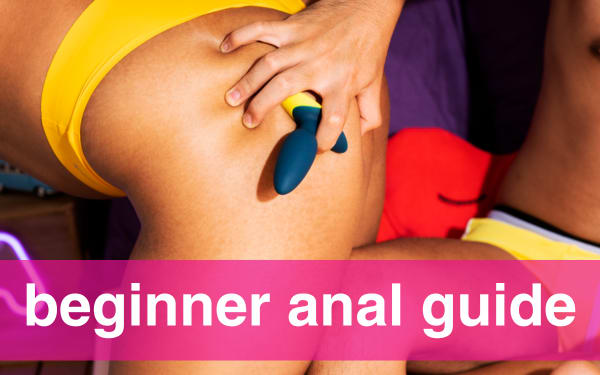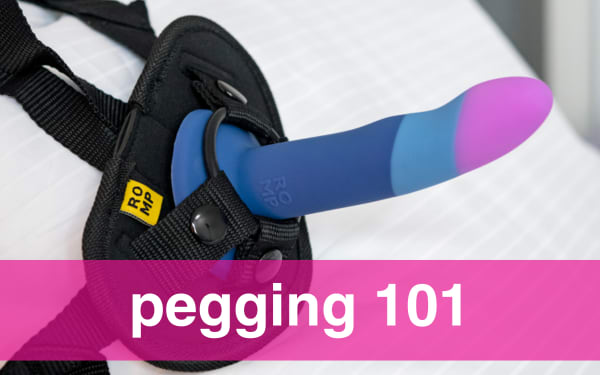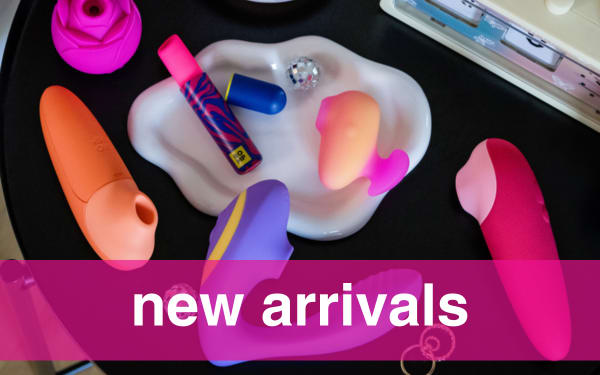What is ‘Mindfulness’ in Sexual Wellness and How Can You Practice it?
As you attempt to reach orgasm, you find yourself thinking about an email you forgot to send. Or maybe it’s self-consciousness about how your body looks at this moment. Perhaps even the internal pressure to ensure that your partner is having a good time, too. Most of us have experienced feeling distracted during solo or partnered sex.
Without a clear way to refocus, these distractions may leave us feeling frustrated or upset with ourselves. Fortunately, mindfulness has come along to act as a tool in the arsenal of those available to fight off distractions in the bedroom.
The term “mindfulness” originated in Buddhist and Hindu traditions, gaining traction in the West during the 1970s as it became integrated into psychology and mental health practices. Over time, mindfulness has transcended therapeutic spaces and been interjected into elementary and middle schools, as well as our everyday conversations with friends and family.
The concept is that our brains are so often focused on the past (our regrets and fond memories) or the future (our fears and dreams) rather than the present.
Simply put, mindfulness is intentionally paying attention to the present. It can ease a great deal of past and future-related stress. The same is true of optimizing your sexual well-being. The brain’s job is to always be thinking, which is exactly why the antidote to being distracted during sex isn’t to try to stop thinking altogether or to “just feel”. No, the antidote to distracted sex, and therefore the road to sexual healing, is paved by present thinking.
 The Connection Between Presence and Pleasure
The Connection Between Presence and Pleasure
Aphrodisiacs are foods and smells believed to have the power to boost one’s sexual appetite. They are a testament to the truth that throughout history, people have understood senses such as taste and smell to be intimately related to sexuality.
Perhaps this is so because of those specific tastes and smells (though there is little scientific evidence to support that claim), but more likely, it is because taking the time to engage with our senses is one way of being present. Between these and seeing, hearing, and touching, engaging with your senses is one way of shifting your attention away from distractions and insecurities.
The importance of mindfulness in sexual pleasure is further supported by the work of Dr. William H. Masters and Virginia E. Johnson, renowned sex researchers from the 1960s. They created a technique for couples called “sensate focus”. This series of non-goal-oriented touching exercises was premised on the idea that too much performance pressure is to blame for less-than-ideal sex.
Instead, we should find ways to focus less on the pressures to both provide and experience pleasure and more on being mindful. Though originally intended for couples, the idea is universal: existing in the present, sans pressure, is important for your pleasure.
Practicing mindfulness also positions us to do some crucial self-exploration by encouraging curiosity and non-judgmental attitudes toward our thoughts, desires, and boundaries. This self-awareness can not only improve your solo sex life but also help you better advocate for your pleasure during partnered interactions.
The Long-term Benefits Of Mindful Sexual Practices
Healthier Sex Life and Improved Wellbeing
Some of the established benefits of mindful sex are directly tied to the distracted or negative thoughts that mindfulness is intended to replace. For example, research has shown mindfulness can reduce performance anxiety, increase self-esteem, and increase awareness of physical sensations.
But the perks don't stop there! More surprisingly, mindfulness has also been linked to better relationship outcomes and shown to elicit more consistent orgasms as well as reduce various kinds of sexual dysfunction, such as psychological erectile dysfunction. It could potentially improve desire and sexual satisfaction overall.
Mindfulness Techniques for Better Sex
Mindful or intentional touching is about being actively attentive towards sensations you are experiencing. This can look like scheduled sessions of touch with a partner that focus on giving and receiving. This might consist of non-sexual contact like a massage, all the while investigating what feels good. Consider using flavored or scented massage oils and candles to enhance the sensual connection in this process.
Mutual Masturbation
You may even want to do some mutual masturbation or search for “sensate focus exercises” if performance anxiety is a particular concern of yours or your partners’. The person doing the touching may experience just as much pleasure, according to research. After all, we know that touch generally releases feel-good hormones like oxytocin. This practice can act as foreplay in a couple’s slow sex practices and help in cultivating connection while allowing both partners to become more in tune with their preferences.
Sensation play + touch
Conscious touch and receiving touch can also be explicitly sensual and sexual. The BDSM community has somewhat popularized the term sensation play, in which different sensations, ones that may cause pleasure or pain (or painful pleasure), are experimented with. Examples include temperature play like an ice-cold, stainless steel sex toy straight out of the freezer or warm, body-safe wax. It can also be a feather or pinwheel traced along your spine or flavored lube in your mouth.
Sex toys + vibes
Beyond sensation play, sex toys for couples are also a great way to keep a clear mind and stay in the moment. Vibrating rings are a hands-free way to stimulate nerve endings of both the penis and the vulva simultaneously to boost pleasure. Some can also be used during masturbation to increase sensation.
Couples vibrators can be used by all genders and sexualities on different erogenous zones during both solo and partnered sessions. Some are wearable, meaning they can also be used hands-free during sex and reduce distractions even further.
Listen to yourself
If you aren’t ready or interested in experimenting, there are other options as far as mindfulness practices for couples. During sex, you may ask yourself, does one part of your clitoris or penis experience more sensation than the other? What is your favorite part of your partner’s naked body? These are questions that can pull you into the moment.
I often advise people to repeat in their heads a phrase like “this feels good” during partnered sex. Thinking this to yourself may prompt you to examine “what feels good?” and the present-tense “feels” (as opposed to "felt" or "would feel”) replaces any thoughts of the past or future.
If, in evaluating what feels good, you come across sensations you particularly like or particularly dislike, you may even be better able to communicate them.
Mindful Masturbation Techniques
Breathwork
Mindful masturbation can center breathwork: the act of noticing and strategically adjusting your breathing. In spirituality as well as psychology, meditation is considered a means of becoming more mindful, and as anyone who has ever tried to meditate can tell you, tracing your breath is the first step in becoming clear-headed.
The practice of consciously following your breath can be helpful in reaching orgasm as well. In fact, often before or during orgasm, one’s breaths may naturally become short and rapid in preparation for climax and release, but mindfully taking slower, longer breaths can introduce a new type of pleasure into your life and savor the experience more fully.
Engage your senses
Solo play may also be a good time to take your time and engage those senses. Light an aromatic candle, play music, or slowly caress various parts of your body. When distracted or negative thoughts arise, redirect your attention to the smells of the room, the melodies from your speaker, or the feeling of your fingertips gliding over your body.
Beyond making for a more pleasurable session, mindful masturbation can also create a deeper understanding of your preferences, helping you connect with your body in an exploratory way.
Adjust your goals
The pressures of crafting a “new you” for the “new year” often center on financial ideals, fitness goals, travel, and home. Many of the factors involved in achieving those goals are out of your control, and it can feel frustrating carrying the same resolutions from year to year. This year can be different by setting goals directly related to pleasure and joy – an internal goal that is more within your control.
Overcoming Distractions for Better Fulfillment
Distracted sex may feel like a burden, but it actually reminds us that sexuality is not only about penises and vulvas. The brain is, in fact, the largest sex organ, and acknowledging our minds is crucial in creating holistic sexual practices. Erotic mindfulness is a gateway to fulfilling intimacy and improved self-awareness.
Whether this year will consist of engaging in mindful touching with a partner or incorporating mindfulness techniques into solo play, I encourage you to try it. Of course, our thoughts can stray, and that’s okay. Try these tips and find what works for you.
Over time, mindfulness can help transform your sexual experiences and strengthen your connection with both yourself and your partner.
Tara Michaela Jones is a Black, queer sex educator based in Philadelphia and New York. She is the founder of The Youth Sexpert Program, a non-profit training program that aims to provide comprehensive sex education for high school aged youth, so they can become their community's sex expert. Her work focuses primarily on how injustice manifests in sexual interactions. She uses her social media platforms and written pieces to connect with her community on these issues.





















